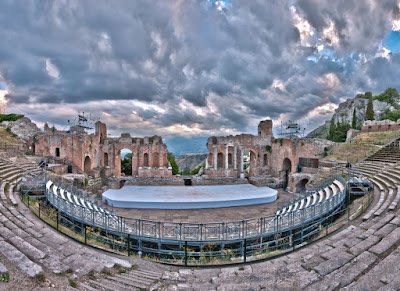 |
| Image credit. Continued from John Gray's Liberalism (2) |
In assessing traces of liberalism in Ancient Greece, John Gray seems to argue that Benjamin Constant's distinction between ancient and modern freedom is basically sound, at least, to the extent that freedom in Greece was not thought of as an institution to protect personal autonomy, but as a dimension of civic virtue, or in Jerry Miller's terms: civic republicanism. A citizen's freedom entitled him to a voice in collective decision-making. But this right was an expedient furthering a man's ability to serve his polis and the conditions of its thriving: self-rule and the absence of external control.
As I write here:
Freedom is serving the community, freedom is assuming a role, fitting into the community so as to preserve its capacity for harmony.
It is striking that (a truncated, young shoot of) freedom and (widening) political participation emerge as twins. However fragile and short-lived, the ancient Greeks have experimental encounters with the presumably benign effects of open and vivid debate on a community's chances of survival. Ancient freedom is directed at improving the breadth of information from which to draw strategies to strengthen the polis.
Recognising, or at least testing, the usefulness of broad-based deliberation seems to have spearheaded further social hypotheses such as the universal equality of men, and even conjectures relating to the advantages of individual freedom - "germs of liberal ideas among the ancients." (p. 3) Also consider Freedom and Ancient Greece.
Gray quotes G.B. Kerferd:
"The importance of this doctrine of Protagaras [= Protagoras, IGTU] (of political equality) in the history of political thought can hardly be exaggerated [...] Protagaras produced for the first time in human history a theoretical basis for participatory democracy" - the basis being Protagaras' doctrine that all men have a share (though not the same share) in justice. (p. 4)
These attempts at liberty remain germs, though.
In the works of Plato and Aristotle, we find, not the further development of the liberal outlook ... but instead a reaction against it - an emasculation of Greek liberalism., or a counter-revolution against the open society of Periclean Athens. In the works of Plato and his disciple, Aristotle, the sceptical and empirical outlook of the Sophists and of Democritus is replaced by a species of metaphysical rationalism, and the ethics of freedom and equality are repudiated, radically by Plato and more moderately, but no less consistently, by Aristotle. (p. 4 and 5)
Elements of freedom reappear in ancient Rome:
Among the Romans, the Laws of the Twelve Tables ... embodied important guarantees of individual freedom. The first of the public laws they contain enjoins that 'no privileges or statutes shall be enacted in favour of private persons, to the injury of others contrary to the law common to all citizens and which individuals, no matter of what rank, have a right to make use of'. It was on this basis that there grew up in Rome a highly developed and in many ways strongly individualist private law. This individualist legal tradition decayed in later times, especially under the rule of Justinian and Constantine, but it was influential in modern times through the medium of the Latin Renaissance of the seventeenth century. (p. 6)
And finally John Gray has this to say of Christianity:
[T]he moral inheritance of Christianity to the medieval and early modern periods was complex and even contradictory. While Christianity indeed brought an end to the ancient tradition of freedom of enquiry and comparative religious toleration, at the same time it transmitted to us the universalist and individualist outlook found in several of the religious and philosophical movements of the later Roman period. (p. 7 and 8)The fate of freedom among the ancients reaffirms later experiences that show that freedom widens its territory concentrically; she is capable of adhering to certain groups and strata of society while not affecting other parts of the population (as in slavery-based Greek and Rome, the Britain of the barons or during the early days of the USA). Freedom is divisible; she is perfectly capable of thriving among the select few.
What were the barriers to liberty's ultimate breakthrough in Greece and Rome, why was she eventually repelled, and under what kind of conditions does she become "ineradicable"? In a word: do the stages of budding liberty tell us more about the conditions of her viability?
No comments:
Post a Comment